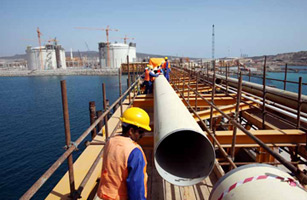
Open pipeline Total's new terminal in Balhaf, Yemen, began exporting gas in November
(2 of 2)
De Margerie's warning carries another message: energy companies need to produce oil and gas anywhere they can. That argument pits him against human-rights groups, who accuse Total and other oil majors of bolstering corrupt and repressive regimes. Last November, Greenpeace activists picketed Total gas stations to protest the company's plans to explore Canada's tar sands, which they fear will cause environmental damage. And despite the prospect of tougher sanctions against Iran, Total is negotiating joint gas production there with China's CNPC. De Margerie rebuffs suggestions that Total should stop selling refined gas to the Islamic Republic. "That embargo will not work," he told a skeptical audience at Columbia University in New York City last November, when asked why he does business with Iran. Instead, he believes blocking gas imports will bolster Iran's government's opposition to the West.
De Margerie's argument that companies are compelled by necessity to deal with undesirable countries leaves many unconvinced. "Oil companies say they have to operate where bad guys are running countries, because that is where oil is found," says William Ramsay, a former U.S. State Department official who now heads the energy program at the French Institute for International Relations. "The rest of the world does not quite buy that."
Nothing has caused a bigger public relations headache for Total than its dealings with Burma, where a bloody 2007 military crackdown against democracy protesters sparked global outrage. The company produces gas in the Andaman Sea and pipes it across Burma, selling some to the Burmese government and the rest to Thai power stations. Human-rights organization EarthRights International has reported the use of "forced labor" along the pipeline, which Total operates with Chevron and Burmese energy companies (Total denies any labor abuses). It has also claimed that Burma's regime is dependent on the billions in revenues it receives from Total and Chevron. De Margerie says Total has established a "code of conduct" in Burma, and claims if Total sold its assets there, community programs it has implemented for locals would likely be scrapped.
The controversy continues; even French President Nicolas Sarkozy has expressed discomfort about Total's operations in Burma. Critics sense Total officials are growing more sensitive to the issue. "They used to shrug their shoulders and say: 'What has that got to do with us?'" says Diarmid O'Sullivan of Global Witness, a London organization that researches corruption in natural-resources deals. "Now the game has really changed ... Eventually transparency will be a selling point for them over the Chinese oil companies."
Still, de Margerie is frustrated at the continuing criticisms over Burma. "Who is telling us who are the cowboys and who are the Indians?" he said at Columbia University. "People who have never been in those countries." Then, calmer, he stressed that a Total withdrawal would leave Burmese residents more vulnerable.
There are few better places to gauge the task Total faces in difficult countries than in Yemen, where the company launched a gas pipeline and export port last November. The $4.5 billion project took 11,000 people four years to build and required agreements with around 20 tribes, in part because the government, which is grappling with an armed rebellion and growing al-Qaeda recruitment among its unemployed youth, has only a tenuous hold over much of its impoverished country. Total employees are barred from leaving the capital, and travel with armed escorts. "This is one of the riskiest areas of the world," says Total's exploration and production chief Yves-Louis Darricarrère on the flight to launch Total's gas-export plant on the Red Sea. "No one thought we could do it." De Margerie did. "Yemen was about audace," or audacity, he says, referring to one of the four guiding principles he has defined for Total since taking control. "You have to be bold."